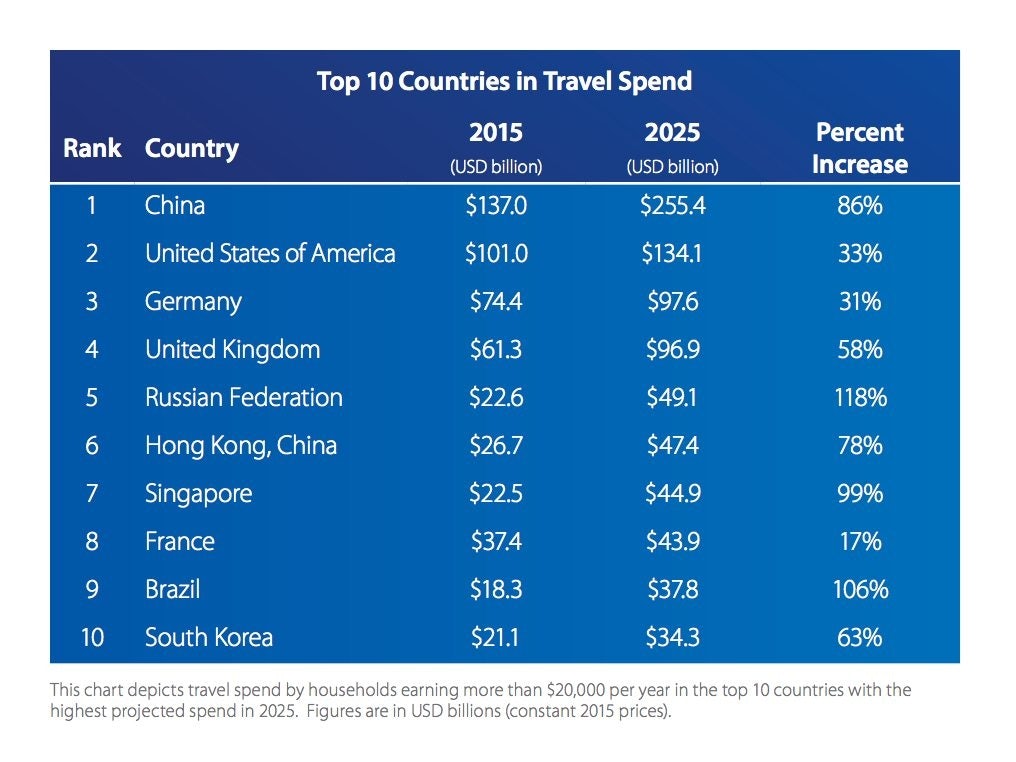China’s outbound tourism boom is expected to remain the largest force in the global travel market over the next decade, with Chinese spending reaching US$255.4 billion by 2025.
This was the prediction of a recent report by economic forecasting firm Oxford Economics and credit card company Visa called “Mapping the Future of Global Travel and Tourism,” which says that this number will be the result of an 86 percent increase in Chinese travel spending in the next 10 years. The 2025 prediction will be up from $137 billion spent in 2015, keeping China far at the top of the list as the number one source of cross-border travel spending in the world. The staggering amount is expected to be almost double that of the United States’ second-place $134.1 billion spent by tourists abroad and larger than that of Germany, the UK, and Russia combined.

The report looks at travel spending by households with incomes over US$20,000 and utilizes Visa payment data as well as Oxford Economics projections, excluding spending on plane tickets. Estimates by previous organizations that include airline ticket purchases have been even higher—a report by the London-based nonprofit World Travel and Tourism Council released in March this year states that Chinese tourists spent a total of $215 billion overseas travel in 2015, while a report by China Luxury Advisors and the Fung Business Intelligence Centre says that overseas travel spending by Chinese tourists actually reached $229 billion last year and will hit $422 billion by 2020.
China is set to make a major contribution to what the report calls the “rising global traveling class” in the developing world over the next decade. These rising middle-class households from emerging markets are expected to take up 45 percent of $1.5 trillion that will be spent on cross-border tourism by 2025. The total number of Chinese travelers heading abroad is set to hit 242 million by 2024, according to previous projections by HSBC.
The report notes that increasing connectivity from new flights and airports will be a major factor in the growth of global tourism spending, and travelers will be savvier than ever thanks to the the rise of online travel platforms and access to customer reviews.
Medical tourism will also be a key trend for the future of the international travel industry, especially in the case of travelers over 65. Thanks to a mistrust of doctors in China as well as rising Chinese demand for plastic surgery and “maternity tourism,” Chinese outbound medical tourism has been growing as travelers head to places such as South Korea, Japan, Europe, or the United States.
The report notes that there are risks to the future of Chinese travel, however, as China’s economy remains on shaky ground. It points out that China’s stock market has lost over a third of its value, stating that “the fall-out from a loss in confidence about the economy can make travelers more reticent about taking a vacation and less likely to go.” In addition, yuan devaluation makes it more expensive for Chinese tourists to travel abroad and can dampen spending.
Nonetheless, the report points out that despite economic turmoil, Chinese tourism appears to be better able to weather these challenges better than counterparts Brazil and Russia, which have been seeing decreased travel spending. The report's prediction of continued future growth is based on the fact that even as China's economy slowed in 2015, Chinese international travel spending grew by an estimated 13 percent.
